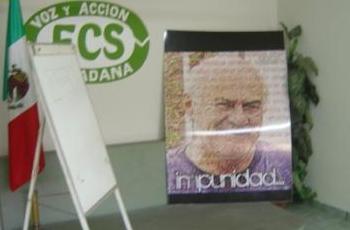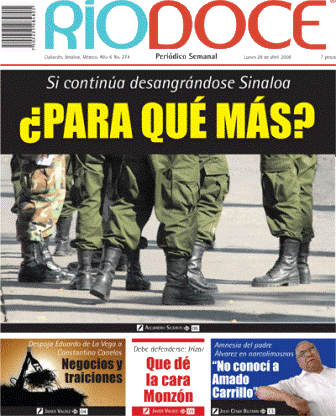The US House of Representatives Tuesday approved a $1.6 billion, three-year anti-drug assistance plan aimed at helping Mexico and Central American countries fight the region's powerful drug trafficking organizations, but the package is now in doubt after the Mexican government voiced strong objections to provisions in the Senate version of the bill that tie the aid to human rights measures. The version of the bill in the Senate has yet to be approved.

The bill, passed by the House 311-106, would begin to implement the Mérida Initiative, named after the Mexican city where US and Mexican officials sat down last year to hammer out an assistance package. Under that plan, the US funds would go for equipping and training security forces in Mexico and Central America and for improving justice systems in the region. Mexico would get $1.1 billion, while Central American and Caribbean countries would get roughly $400 million. Another $74 million would go to trying to slow the flow of illicit weapons from the US to Mexico.
But while Mexico had been eager to win the aid package, it is balking at the conditions in the Senate bill, which include human rights reviews, judicial reforms, and other issues. The conditions mark a return to "certification," where the US unilaterally determined whether nations where complying with US drug objectives, complained Mexican assistant attorney general for international affairs José Luis Santiago Vasconcelos.

Mexican Attorney General Eduardo Medina Mora said last week that President Calderón is waiting to see the final version of the bill before making a decision. "The president will very carefully consider what is finally approved, and defending the best interests of Mexico, will make the correct decision, of that we can be sure," he said.
"I think one way or another, it's dead," political commentator Ricardo Alemán told the Morning News. "Mr. Vasconcelos is a very high-ranking police official and has support from the government," Alemán said, adding that Mexican pride is at stake. "Mexicans are very unyielding on this," he said. "First you reduce the amount, and then you put on conditions, so why don't you just keep your money."
A delegation of US senators flew last weekend to Monterrey, Mexico, to meet with Mexican officials in an effort to assuage their concerns, and there are signs they will seek to remove the offensive language from the Senate bill.
"We heard from everyone here the common message that this language has got to be changed," said Sen. Chris Dodd (D-CT), one of 11 US legislators attending the two-day meeting. "Our friends in Mexico needed to vent and explain how this issue was not handled well," the senator added. "Anything that smacks of certification is a nonstarter."
Now it's time to see if the US Senate will sacrifice Mexican human rights on the altar of the drug war.
This work by StoptheDrugWar.org is licensed under Creative Commons Attribution-ShareAlike 4.0 International
Comments
If they don't uphold human rights in Mexico
Then I think it will be time to start thinking about how to go about abolishing this corrupt government and figure out how to start over again. We will have to carefully consider how to go about protecting and preserving what few agencies that are left that still help the most vulnerable among us, the sick, the young and the old. If they do it to others, they will do it to us. And clearly after the abuses we have already suffered at the hands of disloyal, greedy, corrupt Americans in power they have already been violating many of the rights of Americans.
US Government Money Always Comes With Strings Attached
I hope the Mexican government tells the US to keep the money and clean up the drugs and arms problems its prohibition policy created. The war on drugs in the US is a FAILURE and should be stopped immediately. Maybe US courts could follow the admirable example of the courts in Argentina, if the judges have the courage to do the right thing.
Add new comment